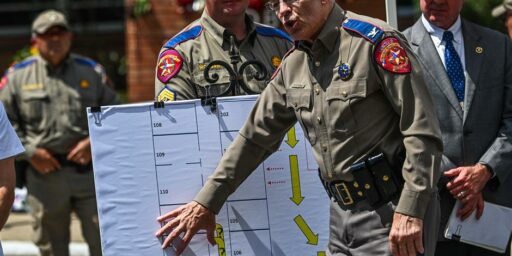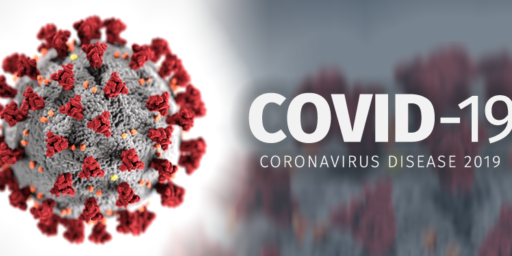CINCY COP CASE
Susanna Cornett has some interesting observations about the current mess in Cincinnati.
I’ve watched the video, and I’ve talked about it with half a dozen police officers, all with 20 or more years on the job and most men I respect who would neither beat down a suspect unnecessarily nor cover for a cop who would. Their opinions reinforced my initial impression: Some decisions could have been made along the path that would have caused it to end differently, but none of the individual decisions (known so far) that the cops made were wrong or outside of procedure. The man was huge. He was high. He attacked the cops. They used departmentally approved procedures to bring him down. The exertion of the fight resulted in cardiac dysrythmia, which he was already at high risk for because he was fat and he was high – similar to the way pepper spray would make a healthy man tear up and be easier to subdue, but could (and has) cause the death of a man with asthma (although different in that the asthma isn’t a condition resulting from personal choices). And also similar to situations where the exertion of intercourse can result in the death of a man with a heart problem.
You know that this will be reviewed intensely, precisely because of the context – black man, Cincy already suspect, widely distributed raw video. And there will be many who won’t believe there wasn’t some collusion when the final result is that the officers are reinstated with a ruling of justifiable force. From all I’ve seen, that ruling would be accurate, although the situation as a whole may lead to some needed changes in procedure – for example, if 10 officers instead of two had assembled before Jones was engaged, the fight would have been much briefer, thus putting his heart at less risk. He may still have died, but it’s less likely, and the cops would have seemed less culpable. As it is, the discussion keeps turning to the nightsticks even though the coroner clearly states that the beating itself did not cause Jones’ death, but rather the effect of the exertion on his heart.
***
To digress further, I’m really really tired of the constant drumbeat on racism in this society that flares up hot any time a person of color is prominently involved in a negative situation, criminal or otherwise. I’ve seen enough and talked to enough people of all races to know that racism still has a foothold in this society to a degree that should be worrisome to all good people. But it does not help the cause of alleviating racism when it’s used as a stick to beat society with at every turn, regardless of its validity. It shouldn’t be ignored, but someone in the black community needs to call a halt to the damage its overuse as an excuse has done, and someone in the white community needs to call a halt to the gross pandering to false claims. It damages the ability to get legitimate concerns addressed, and goodness knows there’s enough of them.
She also links Baldilocks, who has similar thoughts.
I agree with all of this, although I always wonder why minor events escalate out of control so often. Does some yahoo disturbing the peace at a fast food restaurant late at night really warrant a massive police intervention? It’s like the Waco situation a few years ago, where a massive show of force was used to arrest a religious nut for weapons possession. For reasons I somewhat understand, police officers seem to have adopted a paramilitary mindset over the last 20-25 years. Rather than being calm and polite, they now come onto any scene–whether dealing with street gangs or minor traffic incidents–with an “I’m a bad ass and you’d better not mess with me” attitude. This is not only unprofessional but counterproductive, in that it makes ordinary citizens reluctant to cooperate with police.
To use fictional examples, let’s compare old TV cop shows to the newer ones. In Dragnet, Adam-12, Hawaii Five-O and other shows from the 1970s or earlier, we saw cops as quiet professionals. Even when dealing with abusive and obnoxious citizens, the cops were unfailingly polite and calm. Jump to the 1980s and later, with shows like Hill Street Blues, Miami Vice, and NYPD Blue, we see cops who are only slightly more admirable than the criminals they’re arresting. Or the various “Cops” shows where real police officers–knowing they’re on camera even–are virtually all thugs.






Dragnet, et al, weren’t typically dealing with bad asses hopped up on drugs. If you want a one-to-one comparison, think about policing in the days of Al Capone. There’s a place for polite and calm, but there’s also a place where nightsticks are precisely the right thing to use.
One of the concerns I raised to the police officers I talked to was the issue of low level criminality and escalation. Was subduing him worth the cost? Well, they didn’t kill him with their force. The exertion of resisting their force resulted in his death because of his existing preconditions. That shifts the equation considerably. The exact same circumstances, absent his poor health, would likely have not resulted in a death and thus not even made the newspapers, because it really was not shockingly different from dozens of episodes cops deal with.
As for the escalation, think of it this way: When a parent raises a child, consistent discipline and holding the line with your edicts is often more important than the specific punishments for various infractions. If a child breaks something, and is told to apologize, it’s not a huge deal if he promptly does. However, if he stubs up, breaks something else, refuses to apologizes and defies you, you have to win, even if eventually the situation escalates into a much more serious matter than it needed to. What could have been resolved with an apology and reparation actually could wind up with a spanking, confinement to their room for an evening, and having television or other privileges taken away for a week. While the scale of that scenario is very different from what happened to Jones, the basic policing principle is the same.
Society can require exceptions to that rule. The revised policies in regards to police chases are an example. Many towns have decided that it’s more important to lessen the chance of injury or death that could result from police chases, than to run down a miscreant who’s escaping via vehicle. There are still chases, but the allowable scope has narrowed considerably in many jurisdictions. We could see similar changes in approach to use of force.
Clearly, different situations call for different approaches. But I’m not sure coming in ready to crack heads is the way to deal with one unarmed yahoo. All you’re going to do is cause him to go nuts and then be forced to beat him down.
But police increasingly seem to apply the tactics they uses to deal with inner city gang wars to obiously non-dangerous situations. Even routine traffic stops are often displays of “attitude” on the part of cops. They have this mentality that they are somehow entitled to be deferred to when, in reality, they are mere public servants. Citizens aren’t supposed to have to fawn over them–but the cops feel entitled.
Cops seem to think they’re soldiers now, wearing bloused boots, SWAT type fatigues, and other paramilitary affectations. Domestic law enforcement can’t be treated like military occupation–but it increasingly feels that way.
I don’t think they came in ready to crack heads. The paramedics came in to check on the passed out guy. He woke up and started acting strangely, even dangerously. The fire department called the police in. Two officers showed up, and if I recall they didn’t even have nightsticks out at first. Only when this guy charged another officer, knocking him down, did his partner rush in and start delivering blows with his nightstick.
There’s been too many cases of cops being blindsided with fists, knives, guns and other weapons. If they had pulled out their guns and shot him than there would be a valid point of overagression. But they used the appropriate amount of force to stop a guy who was clearly not thinking straight and continued to struggle and escalate the situation.
Pauly,
I’m only somewhat familiar with the case, having heard about it on NPR and read a bit about it. My criticism isn’t that the cops are guilty of brutality but of a general trend toward a “Billy Bad Ass” mentality on the part of cops.
James,
You need to see the video. Then tell us who was trying to be the bad-a**.
This guy was out of control. Homicide? Whatever.
Yes, the video makes a world of difference. Only a couple news sources have reported the entire story accurately, including the part where the guy shouts “Redneck, whiteboy” at the cop before he charges.
And yes, too many cops think that they are Sgt. Slaughter, especially towards your average nice citizen. But I guess you can never really tell who the psychos are so you probably get jaded after a while.
James- Your larger point is absolutely correct.
However in this case the cops were taped asking him very nicely and backing away from him as he approached. I don’t remember the exact time, but they have like 9 minutes of tape of the cops dealing with him politely before he went loco.
I take your larger case and it is valid. But in the specific case the guy got what he deserved.
The fact this case is being debated is another example of the failings of the civil rights movement.
I’m probably a bit late to comment here. I just discovered the site–and I like it a lot.
I agree with James about disquieting trends toward paramilitarism among police, but I’m not sure what point he’s making about the cop shows. The nasty fictions of the 1980’s can be viewed as deliberate overreaction to the falsity of always-civil heros in the previous generation. The relationship between art and life (if we can call cop shows “art”) is always difficult to discern.
I look forward to a generation of shyster-lawyer shows that counterbalance the overly respectful depictions we see these days.
Alan,
I dunno: Most of the lawyer shows nowadays show them as pretty sleazy characters. Compare “The Practice” with, say, “Perry Mason.”
—